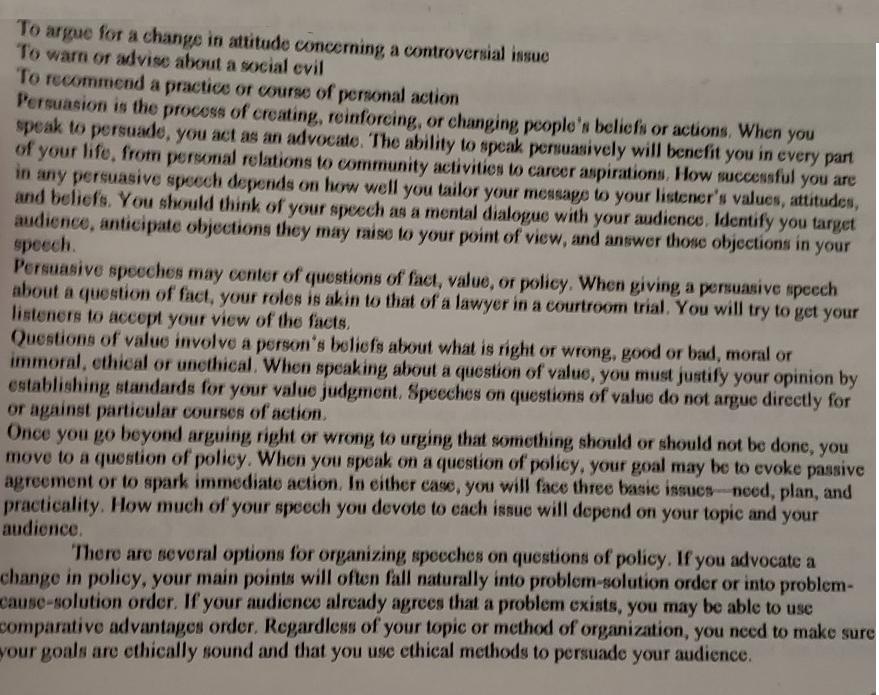To argue for a change in attitude concerning a controversial issue To warn or advise about a social evil To recommend a practice or


To argue for a change in attitude concerning a controversial issue To warn or advise about a social evil To recommend a practice or course of personal action Persuasion is the process of creating, reinforcing, or changing people's beliefs or actions. When you speak to persuade, you act as an advocate. The ability to speak persuasively will benefit you in every part of your life, from personal relations to community activities to career aspirations. How successful you are in any persuasive speech depends on how well you tailor your message to your listener's values, attitudes, and beliefs. You should think of your speech as a mental dialogue with your audience. Identify you target audience, anticipate objections they may raise to your point of view, and answer those objections in your speech. Persuasive speeches may center of questions of fact, value, or policy. When giving a persuasive speech about a question of fact, your roles is akin to that of a lawyer in a courtroom trial. You will try to get your listeners to accept your view of the facts. Questions of value involve a person's beliefs about what is right or wrong, good or bad, moral or immoral, ethical or unethical. When speaking about a question of value, you must justify your opinion by establishing standards for your value judgment. Speeches on questions of value do not argue directly for or against particular courses of action. Once you go beyond arguing right or wrong to urging that something should or should not be done, you move to a question of policy. When you speak on a question of policy, your goal may be to evoke passive agreement or to spark immediate action. In either case, you will face three basic issues-need, plan, and practicality. How much of your speech you devote to each issue will depend on your topic and your audience. There are several options for organizing speeches on questions of policy. If you advocate a change in policy, your main points will often fall naturally into problem-solution order or into problem- cause-solution order. If your audience already agrees that a problem exists, you may be able to use comparative advantages order. Regardless of your topic or method of organization, you need to make sure your goals are ethically sound and that you use ethical methods to persuade your audience. Research: You are required to use credible and current sources to support your point of view and supply sound reasoning. You will demonstrate research skills using appropriate technology, including gathering, evaluating, and synthesizing primary and secondary sources. All material must be property documented in a bibliography and orally cited in your speech. Minimum of three library sources (1 book and two articles). Visual Aids: You may use visual aids for this speech. Delivery: This speech should be delivered extemporaneously. You must be able to move around freely when using an aid. Suggestions: 1. Try to establish a common bond with your audience. 2. Keep speech short and to the point. 3. Make sure you pronounce all names correctly. 4. Make sure your facts are accurate Written work to hand in: Complete-sentence outline and speaking outline
Step by Step Solution
3.44 Rating (151 Votes )
There are 3 Steps involved in it
Step: 1
My topic is The problem with singleuse plastic and why we need to change our attitude towards it I Introduction A Attentiongetter According to National Geographic humans have produced 83 billion metri...
See step-by-step solutions with expert insights and AI powered tools for academic success
Step: 2

Step: 3

Ace Your Homework with AI
Get the answers you need in no time with our AI-driven, step-by-step assistance
Get Started


